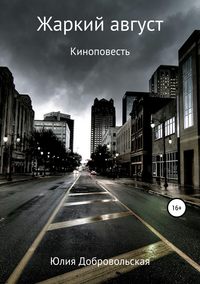
Полная версия
The Lovers

Julia Dobrovolskaya
The Lovers
© 2017 by Julia Dobrovolskaya
All Rights Reserved
Translated by Sofia Gutkin © 2017
This English-language translation was funded by generous contributions from:
David G. Brown
Fred Clipton
Chris Florio
Becky Gentry
Lisa Harvey
Jim Kostopoulos
Sari Lewis
Vicki McDermitt
Mike Ricker
Tim Schumacher
Jake Valentine
Thank you to all!
Dina
The Final Exam
Dina Turbina stepped out of the university doors into an overcast day.
One could say that the colors surrounding her, washed out by the fog and the feeble rains of the past few days, and inspiring autumnal sadness, did not match her mood at all, which was upbeat and focused, as if ready to break out into song. But Dina didn’t believe in such a thing as bad or good weather. She accepted without any judgment both the bleak days with their faded colors, and the bright sun in a blue sky, without classifying them as “good” and “bad,” or “sad” and “happy.” For Dina, the world was always wonderful and surprising, and each kind of weather had its own charm. Certainly, her mood was not always so uplifted, sometimes it went downwards, but the weather had absolutely nothing to do with it. Dina was more likely to make her surroundings match her mood!
She put on her sunglasses, which transformed everything around her, making the world appear bright and gold, like the seaside in the peak of summer.
Dina loved the sea, but she still had two whole months left to wait. Two months of internship, which was almost a real job, almost aligning with her specialization, for which she would be paid almost a real salary, one that Dina was planning to spend on a trip to the seaside.
Meanwhile, it was the very start of summer. The beginning of a typical weekday. Yet her work was already done for today, and for next week too. She had passed the last, most difficult exam for this semester, for the most important subject for her future profession. She passed under the strictest and most demanding teacher. The most attractive teacher at their university. The most attractive man that Dina had ever met so far. This was a common opinion, with every female student secretly hoping for more than just pedagogical favors from Konstantin Konstantinovich Kolotozashvili. In fact, plenty of cute girls got some. That’s what people said at the university.
But that was precisely what Dina did not want to think about.
Better to think of the sea. She was hoping to visit her favorite Feodosia again this summer, once she had finished her internship and saved up enough money. Even her mom had promised to help. Awesome! This was so awesome!
Her near future definitely looked bright and alluring. Yet why could she not let go of the present?
* * *Dina took a question sheet from the table.
The question sheet was not too hard, well, as much as it could be for a very difficult subject. Dina was not scared of any of the topics since she had studied thoroughly and was confident in her abilities. She always completed all the exercises on time and started working on them straight away, not leaving them until the last day or week. She never skipped a class, and she would attend university even if she did not feel well so that she would not miss something that was not written in the textbooks, something that only a master of their craft could tell her. The very fact of her attention to these significant, or even insignificant, details of the studied subjects, tended to flatter the lecturers and garner her extra affection. The teachers liked Dina. Not only for her responsible approach to study and solid knowledge, but also for her calm and friendly nature.
Dina took the question sheet and walked towards the last table.
The students attending this exam used only the last tables. Everyone knew that this was the way Konstantin Konstantinovich Kolotozashvili liked it. Firstly, the student answering thus didn’t unintentionally disrupt the person preparing for the exam, and secondly, this way the teacher could more easily spot the ones using cheat sheets.
Although he insisted himself: “You must write cheat sheets!”
Yes, that’s exactly what he had said. “I strongly recommend that you write cheat sheets when preparing for the exam. But woe to the person, who brings them to the exam!”
“So why should we write cheat sheets,” the students would ask, “if we cannot use them?”
“Because,” Konstantin Konstantinovich had said, “a properly prepared cheat sheet is a concentrate, an essence…” He loved to wrap even everyday concepts in terms related to his subject, “an essence that is easier to remember, and which requires only the addition of a verbal broth to become the solid information, from which it was made.”
That was why Dina wrote cheat sheets, and not just for that subject. But she never took them to a test or an exam.
Afterwards, her cheat sheets, written in her clear small handwriting, were hot property amongst her classmates. They were even handed down like heirlooms to the younger students, for nobody else could create concentrates of such quality. Dina never could explain to them that the only useful cheat sheets were the ones you had written yourself.
Dina took the question sheet and walked towards the last table.
One of the three topics was one that Kokon (what the students called Konstantin Konstantinovich behind his back) was failing all the students on.
Dina articulated her answers quite quickly, and remembered everything that she knew from the supplementary material. The material was not compulsory but it gave the answer elegance and utter completeness, and elevated the person answering to the status of the initiated.
It would be a lie to say that Dina was not nervous. Of course, she was nervous, like any normal student. The difference was that she could pull herself together internally and forbid herself from wallowing in any destructive emotions and thoughts. It was as if someone inside her, someone invisible in everyday life, suddenly came alive and told her, “If you fear failure, it will immediately appear.” Even when she was getting sick, Dina heard the voice: “You cannot fear illness or it will be stuck inside you for a long time, simply accept it and deal with it like an opponent, eye to eye like an equal.” Dina believed this Inner Voice ever since the time that she had ignored it, and was immediately beset by a problem which the Inner Voice had persistently warned her about. She had gotten off easy that time…
The First Life Lesson
Dina was eight years old. One winter day, after hours of sledding down hills with friends on the shore of a frozen river, she was returning home during dusk, along a road cleared by the bulldozer, between the town and the Selkhoz. That was what they called the village across the river where the town’s agricultural sector was located, with two-story white houses, stables, cowsheds, vegetable silos, and as it seemed to Dina back then, endless fields.
It was not far to the first town houses, and Dina could already see the lamp shades glowing in the windows and the potted plants standing on the windowsills.
Suddenly, a pack of dogs appeared from around the corner in front of her. There were about ten of them. They walked towards her in a lazy, sated jog, occasionally sniffing the snow alongside the road and playfully snapping at each other. They were returning from the various city rubbish tips – school, kindergarten and hospital tips – where they could always find plenty of after-dinner leftovers.
* * *Dina had never been afraid of dogs until last summer in Anapa, where she had been bitten by a cute ginger mutt called Bobik.
Bobik looked really placid and lived chained to a wooden doghouse in the yard of a house where Dina and her mom, as well as her mom’s friend Albina and son Sergey were renting a room. Dina knew that at night the chain was attached to a wire that stretched alongside the fence, and Bobik thus guarded the large fruit garden, the yard, and the house. Dina also knew that she was not to approach Bobik’s kennel as the owners had warned all their guests about this.
Nevertheless, Dina was tricked by the placid appearance of this fluffy ginger dog with a black muzzle, shiny dark nose, and a tail that curled like a bagel.
One day, she approached the kennel, squatted down and started talking to Bobik. He sat with his side to Dina, his sweet smiling face turned towards her, his tongue hanging out and his wagging tail raising a cloud of whitish dust. When Dina realized that Bobik had been unfairly slandered and was really very nice, she stretched out her hand to pat him. Bobik suddenly growled and jumped on her, knocking her to the ground and sinking his teeth into her chest.
She must have screamed, although she did not remember this. She only remembered the owner with the strange name of Nikandr Nikandrovich lashing Bobik with a thick rope that he had folded a few times over.
After that, Dina’s mom took her to the hospital every day, where she had injections into her stomach. They also stitched together the ragged wound from Bobik’s sharp teeth on her chest, and stuck a plaster over it, so that Dina had a patch of white, untanned skin there.
* * *The dogs were approaching Dina but not paying her any special attention, she was just a girl that they were passing by.
It was probably the first time that Dina clearly heard her Inner Voice. The voice said, “Keep walking, don’t even think of getting scared and running away!”
Dina listened to the voice, gathered up all her inner strength and drew level with the pack, neither slowing down nor speeding up.
The pack flowed around her, without forgetting to utter a few yelps in her direction. Perhaps it was a greeting, or maybe a warning, like, do not even think of provoking us, we won’t care that you are small and helpless.
“Don’t run, just don’t run,” Dina kept repeating the advice of the Inner Voice. But her back went numb from the thought that a whole pack of semi-wild dogs was ambling behind her right now, and who knew what they might decide to do…
Something snapped inside her, the fear became impossible to control, it blanketed her eyes and mind, and drowned out the voice. She ran. She did not understand or feel anything. She was vaguely aware of the dogs, who had immediately caught up with her, surrounded her and were running alongside her, barking loudly and snapping at her tights and the edge of her coat.
They fell back only where the country road became the town pavement.
Dina ran into a shop on the corner of the nearest building – it was the biggest food store at the time in their small town – and then finally came to her senses.
She stood in the entryway between the two glass doors, one leading into the shop and the other one leading onto the street, and leaned against the wall.
The dogs were gone, she was safe, her coat was not torn, so they hadn’t bitten her, only scared her, and her face wasn’t wet, so she hadn’t been crying. It was good that she had not screamed or cried. She did not know why she thought this was good.
It was very bright in the shop from the many hanging metal ceiling lamps, and it always smelled of milk and fresh bread, which was lying on wooden latticed shelves on wheels.
Every section in this shop had its own sound.
The glass sounds lived to the right of the doors: it was the bottles knocking dully against each other in their wooden pallets, while the glasses jingled merrily on their enameled trays. There was also the babbling turning fountain, which the saleswoman Valya used to wash the dirty dishes. One could drink some juice here, tomato, for example, which poured thickly from a large glass container with a lid into a faceted glass, and foamed in its own special way, not like the grape or apple juice. Or soda water, for example, cream soda, which flowed with a hiss from the long-necked green bottle, and one had to quickly bring the glass up to one’s lips so that the nose and lips were sprayed with tiny bursting bubbles and their wonderful sweetly-sour smell of cream soda.
The grocery section resounded with the crunching of newspaper sheets, which were used to make bags for pasta, flour or chocolates, and the rustling of round aluminum scoops, scooping up pasta or sugar from the sliding plywood boxes or directly from the large shaggy gray bags, standing on the floor.
A whole symphony was taking place in the dairy department… First, the people waiting in line for the milk heard a dull grinding of metal against the pitted cement floor – that was the heavy full milk churns being dragged towards the counter using hooks. Then came a jingling and a sucking noise – two churns were opened and immediately came the sound of clanging of the liter or half-liter long-handled aluminum ladles against the customers’ containers, accompanied by the delicious, thick bubbling and then the equally delicious burbling of the milk, as it first filled the ladles and then the customers’ cans. Then jingled the lids of the empty large churns and the full small cans. The empty churns were noisily rolled back to the storeroom, and then the dull grinding of the full churns being dragged to the counter could be heard again…
And above it all came the chiming of coins being thrown into the cash register drawers, or onto the metal money dish, which was screwed to the stand, the lively clicking of buttons with numbers and the juicy chirring of handles, which looked like meat grinder handles, but which produced a blue-gray receipt instead of mince…
* * *The door opened, and Dina’s mom came into the store. Mom always came into the store after work.
Dina did not tell her about what had happened so that she would not get worried.
In the evening, as she was falling asleep, it struck Dina that what happened today only happened because she hadn’t listened to someone’s wise and sensible advice. She decided not to do this in the future, no matter what.
Konstantin Konstantinovich Kolotozashvili
“Turbina, I can see that you’re ready to answer,” came the soft baritone of the teacher.
“Yes, I am ready, Konstantin Konstantinovich.”
“Please.” He moved the chair beside him slightly, gesturing for Dina to sit down.
Walking towards the teacher’s table, Dina noticed that Konstantin Konstantinovich was watching her legs, as if afraid that she would trip over the scuffed linoleum or slip on it.
Yes, that was how Dina first interpreted her teacher’s intent attention to her clicking heels and her ankles, in no way special from her point of view, and her knees, peeking out from a not-so-short skirt.
In the next second, Dina smiled, almost audibly, at her own naivety.
She stopped abruptly.
Konstantin Konstantinovich, a raven-headed, eye-catching thirty-year-old man, always dressed in a sharp dark suit, white shirt, and fashionable tie, looked up into Dina’s eyes. His face was somewhat puzzled, as if asking, “What is the matter, young lady?”
Dina continued her journey, holding her teacher’s gaze with her own.
She approached the table, pulled out the chair and sat down. Then she crossed one leg over the other. She did it all in her usual leisurely manner, with a dignity that nobody here at the university had any idea about.
With a smile, containing a mixture of surprise, admiration, and the recognition of being beaten by a worthy opponent, the man took Dina’s ticket and put it in a pile with the other used ones, without checking what was on it. Then he moved aside Dina’s draft answer sheet in the same manner. Konstantin Konstantinovich quickly wrote something down on a clean sheet of paper, and pushed it towards Dina, saying loudly, so that the whole auditorium could hear him:
“I do not doubt your knowledge, Dina Aleksandrovna Turbina. I therefore don’t intend to waste your precious time. Your record book, please.”
Dina opened her record book on the required page, with all the subjects there showing only “Excellent,” and read the message on the sheet of paper, written in large, fast handwriting: Today, at 18:45 in front of the Peace Cinema.
The teacher signed Dina’s record book. “Congratulations on an excellent finish of the semester, Dina Aleksandrovna.”
“Thank you, Konstantin Konstantinovich,” replied Dina and reached for her student ID.
Konstantin Konstantinovich held down the corner of the record book with his index finger. Once Dina lifted her eyes to look at him, he released the book and said in the same playful tone, “See you in the next academic year, Dina Aleksandrovna. Have a good internship and enjoy your holidays!”
“Goodbye, Konstantin Konstantinovich.” Dina stood up and walked stately out of the auditorium.
Click… click… click… her heels counted the distance from the table to the door, from this year’s last exam and until next year, the final year of university.
Dina could physically feel Konstantin Konstantinovich’s eyes on her calves. As she was closing the door behind her, Dina turned around and could verify that she was right.
* * *That was what would not let Dina go from the cloudy late spring of the present into the sunny summer future. The note, inviting her on a date with the most gorgeous but also the most fickle – so her not-overly-experienced heart told her – the most fickle man in the world. And this man’s undisguised interest in her appearance, or to be more exact, her legs.
All this thrilled Dina and made her waver between sweet anticipation and vague fears that sent chills down her spine. And to feel sorry that the next academic year was so far away…
Why, why would he want her? Hasn’t he got anyone else to go to the movies with? It is not like there was a lack of beauties at their university or even the whole big city.
“Don’t think about it!” she heard suddenly. It was her Inner Voice. “Do you want to go on this date?”
“Yes… I do.”
“Then go. Don’t worry about the other beauties for the moment.”
On Beauty
Dina did not even consider herself cute.
Not because of an inferiority complex, so often present in young ladies, who were not fortunate to become the center of universal male attention. Not at all. The reason was that Dina’s ideas of beauty were based on such unattainable ideals that even the girls others considered beautiful and attractive did not deserve such labels in her opinion. Perhaps only Rimma Yakovleva, the second-year girl that Dina shared a room with, could be called cute… Therefore, there was no point in getting upset if you weren’t born looking like Anna Magnani! You had to be satisfied with what you had.
It was Anna Magnani who was the benchmark of female beauty for Dina, and not Brigitte Bardot and Sophia Loren, whom all the girls her age were obsessed with.
“She is hideous like Baba Yaga!” laughed her classmates at first, and then the girls at university, looking at the portrait of the little-known actress.
“You just don’t know anything about beauty!” replied Dina with a quiet dignity and the unwavering certainty in her right to have an opinion that differed from the majority.
She did not become offended. What did she have to be offended about? The fact that they lacked the emotional subtlety to sense – sense rather than see – what true beauty was? She should not be offended by them but pity them.
Dina did not yet have a benchmark for male beauty. Nevertheless, the sickly-sweet blue-eyed Frenchman that everyone swooned over conjured up in her a feeling of dislike, almost disgust. Muslim Magomaev, on the other hand, whom Dina had only seen in magazine photographs, but knew and loved his voice, thrilled Dina. And Jean Marais… Although Dina would not have been able to say with certainty whether it was the character of d’Artagnan, the valiant musketeer, that she loved, or the actor playing him. One way or another, in both d’Artagnan and Jean Marais, Dina sensed the important thing that every woman subconsciously seeks in a man: nobility and virtue, and the ability to protect the lady from all troubles. Dina did not yet know if nobility and inner strength went hand-in-hand with external beauty.
Dina was a slender girl, slightly taller than average, with great posture and the unhurried walk of someone who is sure of themselves. Her mom had taught her from childhood to watch her posture. She had also taught Dina everything else that made her extraordinarily unique: good manners, how to take care of herself, careful wardrobe selection, and later, make-up.
“Even if you’re no great beauty,” her mom always said, “your face, hair and nails should be always well looked after.”
“Even if you don’t have a lot of clothes,” she continued, “the ones you have should be of good quality.”
“Never,” her mom also said, “Never chase after the latest fashion. It’s better to find your own style and stick to it. You can make references to the current fashion trends perfectly well using accessories.”
How this provincial woman, who had never finished high school, could know these very un-Soviet things, Dina had no idea. And why, despite all this, her mother did not follow her own principles, was a mystery too.
Dina dressed with her mom’s help. Her mother sewed or re-sewed from her own clothes the items she thought a metropolitan student needed.
This included a formal suit, a few blouses, a few skirts, and an evening dress, of course. Only the outerwear and shoes were bought in the stores. Well, and the underwear, of course. For those things, Dina’s mom selflessly saved money from her modest salary, often denying herself some nice trifle.
“Sweetie,” her mom would say when Dina would try and dissuade her from a new purchase, “Dinochka, I’ve already proven myself, but you need to make a statement: a fine dress helps to impress!” And she would laugh a bright, child-like laugh.
Nevertheless, even with such a low assessment of her appearance, Dina did not think that she was any worse than the people around her.
“I’m just different from the rest.” She comforted herself this way until she got used to this self-identification, which worked like a filter, capturing and rejecting unwanted thoughts and feelings about her appearance, which were nothing but a distraction from life itself, so beautiful and amazing in all its aspects.
“Even girls worse-looking than me get married.” She would tell herself when she noticed an engagement ring on the finger of a really homely woman.
Until one day, her Inner Voice said in response, “All sorts of people get married… but is that what you want?”
“What are you talking about?”
“Do you really need someone to put a ring on your finger? Is that the extent of your dreams?”
Dina thought about it and replied, “No. I don’t think so.”
“So what is your dream?”
Dina thought about it again. “I want to love and be loved.”
“There you have it,” said the Inner Voice. “Being married does not necessarily mean loving and being loved. The reverse is also true: mutual love does not always imply marriage.”
“Really?” Dina was surprised.
On Family and Love
Like all girls, Dina of course thought about love and happiness, and about a family that she would someday have. She mentally tried on some guys as potential husbands, only the ones that she liked, of course.
Take Sergey, for example, who was the son of her mom’s friend Albina. He was four years older than Dina and they had known each other since early childhood.
* * *When she was five years old, Dina realized that she loved Sergey.
She understood this by the indescribable happiness that she felt whenever her mom mentioned Albina, and any discussions of plans to do with Albina, which meant that Dina would see Sergey, and that her joy meant love. For what is love without joy?
Sergey was kind and sweet, and looked after her from the position of his age and life experience, after all, he was already going to school and knew a great deal.









